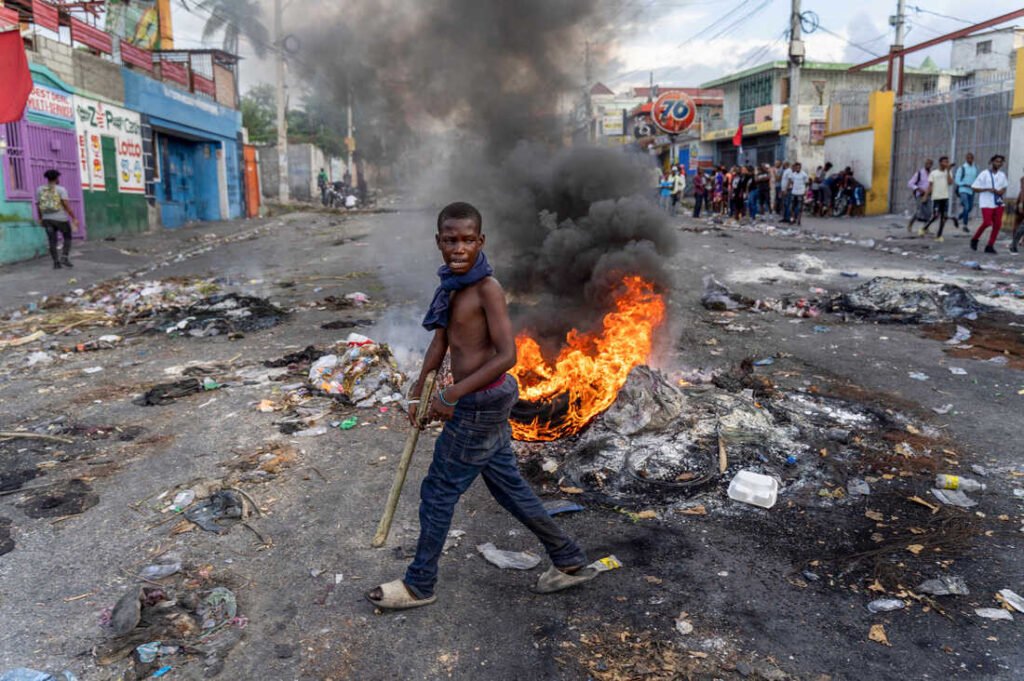When one thinks of the Caribbean Islands, the first thought is a beautiful ocean, great drinks and a place to escape and have a wonderful vacation, which is true for the Dominican Republic, which occupies half of an Island shared with its neighbour, Haiti, in Chaos.
Since the assassination of President Jovenel Moïse in July 2021, Haiti has lacked an elected head of state. A Transitional Presidential Council, led by Prime Minister Alix Didier Fils-Aimé, governs under a cloud of political fragility. In April, the Council approved a “wartime budget” of roughly 36 billion gourdes (≈ US$276 million) to reinforce the police, secure borders, and support essential services. Despite this, state forces remain overstretched, and a United Nations–backed Kenyan-led multinational security mission remains only half equipped and funded.
Into the ensuing power vacuum, gangs have surged. According to the United Nations, armed groups now control 85–90 percent of Port‑au‑Prince. Ghada Waly, head of the UN Office on Drugs and Crime, warned of a “sharp erosion of state authority,” while Assistant Secretary‑General Miroslav Jenca cautioned that “without increased international action, total collapse of state presence is a very real scenario.” Gangs have seized control of trade routes, schools, banks, and with them, basic life in the capital.
In response, the government has deployed weaponized drones, reportedly armed by private contractors. Since March, these strikes have killed at least 300 suspected gang members and injured hundreds more, allowing banks and schools to reopen. Human‑rights monitors, however, warn that drone warfare may erode legal norms and carry a risk of civilian harm.
The Human Toll

By the UN’s count, more than 1.3 million Haitians—nearly 200,000 more since December—have been displaced by violence, internal flight, and terror. Hospitals are shuttering, food insecurity is multiplying, and thousands of children are at risk of recruitment into gangs.
This spring saw a spate of atrocities: in January, the Viv Ansanm alliance attacked Carrefour‑Feuilles, trapping priests in a church, while in October 2024, the Gran Grif gang massacred at least 115 people in Pont‑Sondé—burning homes and clinics. Kidnappings number in the hundreds each month, with many victims unreported amid fear and silence.
U.S. Immigration Policy
On June 4, President Trump reinstated a travel ban targeting 12 countries, including Haiti. Later that month, Homeland Security Secretary Kristi Noem announced that Temporary Protected Status (TPS) for approximately 521,000 Haitians in the U.S. would end on September 2, 2025.
However, on July 1, Judge Brian Cogan of the U.S. District Court in Brooklyn blocked the move. Annotating that Noem “does not have statutory or inherent authority” to curtail TPS before its set expiration—February 3, 2026—he ruled the action “unlawful.” The judge emphasized that Haitians’ ability to work and plan their lives outweighed any governmental interest. The administration is expected to appeal.
What Lies Ahead
- Security Balance: Drones and foreign police may retake parts of the city, but without adequate international reinforcement, the gains remain brittle.
- Violence Escalation: Gangs may retaliate—or employ similar tactics—leading to a dangerous arms spiral.
- Deepening Crisis: Humanitarian needs—shelter, food, schooling—will continue to swell in the absence of sustained aid.
- Migration Pressure: With fewer legal pathways and intensifying insecurity, irregular migration will likely spike.
In Summary
Haiti stands at a crossroads. A weakened government and international responses confront entrenched gang authority. Pockets of hope—schools reopened, services restored—are overshadowed by trauma, displacement, and terror. The deployment of drones may mark tactical progress, but without broader institutional rebuilding and human‑rights oversight, it may amount to a ceasefire, not a resolution. Meanwhile, tightened U.S. immigration policy strains a fragile lifeline. The coming months will test whether global will align with Haitian resilience—or whether the country will slip further into crisis.
Sources
- Gangs control 90 percent of Port-au-Prince; risk of state collapse — AFP/CTV News; The Peninsula Qatar theguardian.comwashingtonpost.com+1reuters.com+1ctvnews.ca+2thepeninsulaqatar.com+2washingtonpost.com+2reuters.com+3en.wikipedia.org+3en.wikipedia.org+3apnews.com+9reuters.com+9reuters.com+9as-coa.org+7reuters.com+7theguardian.com+7
- Kenyan-led security mission under-resourced, 1.3 million displaced — Reuters
- Drone strikes kill hundreds, raise legal and ethical concerns — The Guardian
- Pont‑Sondé massacre and other atrocities — Wikipedia timelines and Reuters en.wikipedia.org
- U.S. travel ban includes Haiti — Reuters
- Noem ends TPS for 521,000 Haitians — Reuters
- Judge blocks early TPS termination, citing statutory violation — Reuters, AP, The Guardian, Politico apnews.com+6thedailybeast.com+6as-coa.org+6


